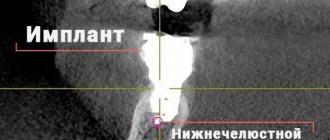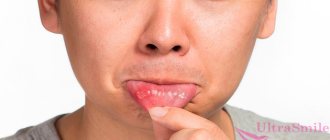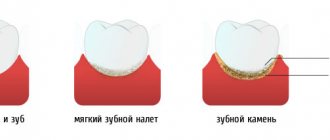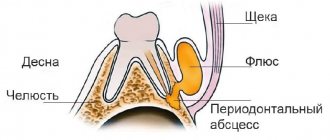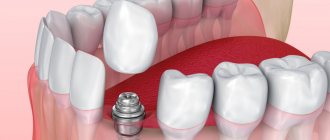May 15, 2020
If the lower or upper jaw becomes numb, this may be a natural reaction of the body, for example, to medical intervention, or it may indicate various problems that require immediate medical attention. In today's article by the editors of the UltraSmile.ru portal, we propose to analyze in detail the main reasons why numbness and discomfort occurs in the lower part of the face.
There can be several reasons for jaw numbness
Inflammatory process on the root of the tooth
If you are wondering why the lower jaw is numb, then the first thing you need to pay attention to is the condition of the oral cavity. An unpleasant symptom can be caused by dental diseases such as periodontitis and a cyst on the root of the tooth. Then, in addition to discomfort, a slight tingling sensation may be observed in the jaw and chin area, as well as pain when pressing or chewing food on the causative tooth.
The photo shows a cyst
Symptoms and manifestations
Trismus of the masticatory muscles is accompanied by limited mobility of the joints responsible for closing the jaw. The inability to unclench them can be of a different nature - from partial to complete immobilization. The mouth may open 40, 20, or 10 mm or less, depending on the severity of the condition. Spasmodic contractions can worsen your overall health, cause headaches and other consequences.
One of the manifestations is inflammatory processes due to jamming of the jaws, in this case there is an alternating reduction of the sides of the face. Less commonly, trismus is associated with tumor processes, accompanied by a noticeable increase in formation and increased symptoms. With viral infections, elevated body temperature is often observed.
Surgical intervention
Some patients report that their upper or lower jaw goes numb after undergoing the following dental procedures:
- tooth extraction: most often, an unpleasant symptom occurs after a complex removal of third molars, accompanied by drilling of the roots, peeling of the soft gum tissue and suturing,
- vestibuloplasty,
- trimming the frenulum of the tongue,
- bone tissue augmentation surgery: sinus lift and bone grafting,
- implantation1: especially when a large number of teeth were restored at once,
- opening and removal of cysts, granulomas, abscesses.
This condition can occur after surgery.
Why does the jaw go numb in the above cases? This may be a normal reaction of the body to nervous and physical stress, surgery, tissue injury and capillary damage. Most often, the symptom is associated with compression (squeezing) of nerve endings due to the formation of physiological edema that occurs after surgical procedures. Normally, the numbness should go away within a week after the intervention, but if it persists longer, it may indicate other problems. Read on!
When your head hurts and your face goes numb
There may be several reasons for feeling unwell. And it is not always clear which doctor to contact with a particular ailment. Our expert will help you navigate. In order to get a complete answer, in the comments to this article you need to:
- briefly outline the main symptoms;
- make the question as specific as possible;
- write a question in the comments under this article.
You will find answers to your questions in the next issue of the section “What kind of doctor do I need?”
Question: I have a terrible headache, and part of my head and face go numb. The hand goes numb, there is not enough air.
Headache is one of the most common symptoms and includes all types of pain and discomfort in the head area. There are four main types of headaches:
- vascular headache occurs as a result of a mismatch between the resistance of the vascular wall and the increase in pulse volume of blood;
- headache of muscle tension: with prolonged tension or compression of the soft tissues of the head;
- liquorodynamic is associated with tension in the membranes of blood vessels (with an increase and decrease in intracranial pressure);
- neuralgic pain occurs when pressure is applied to trigger zones.
There are also mixed headaches with a combination of the main types and psychalgia, or hypochondriacal headache, which occurs with mental disorders.
All types of headaches differ in location and connection with physical activity.
You should also differentiate between headaches and migraines. Migraine is an intense headache, usually unilateral, pulsating in nature, lasts up to 72 hours, may be accompanied by nausea, vomiting, hypersensitivity to light, sounds, etc., intensifies with physical activity. Some patients may experience an aura in the form of a short-term visual disturbance preceding an attack of headache. Facial numbness may also occur both during the aura and at the peak of the headache.
The patient needs to consult a neurologist to identify the cause of the headache, determine treatment tactics and prevent possible serious consequences of the disease.
_____________________________________________________________________
Question: At night I have a cough, as if something is tickling or bothering me in my throat.
Coughing is a protective reflex. It helps clear the airways of excess mucus or foreign bodies. The moment a person coughs, air abruptly leaves the lungs, forcing out what is obstructing breathing.
Tickling and discomfort in the throat can be the body’s reaction to internal and external irritants. Here are the main reasons for the development of cough and throat discomfort:
- infectious diseases of the upper respiratory tract, both acute and chronic: pharyngitis, laryngitis, tonsillitis, rhinitis, etc.;
- allergic reactions: this can be a seasonal exacerbation; allergens can also be pet hair, house dust, household chemicals, bed mites, low-quality bedding, feather or down pillows and blankets, house plants;
- industrial aerosols (dust and gas contamination of atmospheric air);
- smoking;
- endocrine diseases: dryness of the oral mucosa in diabetes mellitus, formations of the thyroid gland, which can cause pressure on the larynx;
- diseases of the gastrointestinal tract with reflux of gastric contents into the esophagus, worsening in a horizontal position of the body, which is accompanied by heartburn, belching, bitterness in the mouth and a sore throat;
- autonomic disorders and neuroses after prolonged stress.
To determine the cause of a night cough and discomfort in the throat, you need to consult a general practitioner who, when collecting an anamnesis and examining the patient, will be able to determine the examination tactics and refer him to the necessary specialized specialists (otolaryngologist, allergist, endocrinologist, gastroenterologist, etc.).
_____________________________________________________________________
Question: Good afternoon. Fingers often go numb - the little and ring fingers on the right hand, sometimes they even turn blue, sometimes the whole palm turns blue. This also happens on the left hand, but less often. During sleep, the hands also turn blue, but completely, from the elbow to the tips of the fingers.
Blue discoloration of the upper or lower extremities is called peripheral cyanosis. Peripheral cyanosis (acrocyanosis) is associated with insufficient blood supply to small capillaries in areas of the skin distant from the heart. This disorder occurs due to narrowing of small capillaries and slow local blood circulation.
Peripheral cyanosis may be accompanied by cold hands and feet, and a feeling of numbness in the extremities. The causes of peripheral cyanosis may be:
- neurohormonal changes associated with the menstrual cycle;
- Raynaud's syndrome (secondary manifestation of a number of causes);
- diseases of the cardiovascular system;
- diseases of the bronchopulmonary system;
- low blood pressure;
- a number of systemic diseases;
- hypothermia, etc.
The patient needs to see a general practitioner, who, after collecting an anamnesis and examination, will be able to determine the examination tactics and refer him to the necessary specialists. In this case, a visit to a cardiologist, neurologist, rheumatologist, pulmonologist, etc. may be required.
occupational therapist, head of the hospital “Clinics for the whole family 1 + 1”
answered your questions Photo depositphotos.com The author’s opinion may not coincide with the opinion of the editors
Medical errors made during dental treatment
Dental treatment, and especially procedures that require surgery, are best done by professional doctors. Then the risk of developing any complications will be minimal. If a patient turns to an insufficiently experienced specialist, then there is always the possibility that not everything will go smoothly. For example, numbness of the lower jaw and chin can occur if the dentist damaged the nerve during the administration of anesthesia through a syringe or injured it during the operation. The cause of the pathology can also be incorrect calculation of the dosage of the anesthetic.
The numbing effect also occurs after improper treatment
Read the article on the topic “TOP 30 dental clinics.” In it you will find information about the best clinics in their segment.
The problem may arise after poor-quality treatment and filling of tooth canals. For example, if the doctor moved the filling material beyond the root. Or, during the treatment of deep caries and pulpitis, he left microbes inside the canals, which subsequently provoked root inflammation and periodontitis.
Measures to prevent trismus
To prevent trismus, it is important to sanitize the oral cavity in a timely manner: remove teeth that cannot be restored, treat caries and inflammatory gum diseases. If prosthetics are necessary, you should contact only qualified specialists, and orthodontic structures should be replaced in a timely manner. The presence of neurological diseases requires constant monitoring by a neurologist.
If you have trismus, you can get advice from dentists at STOMA clinics. If pathology of the temporomandibular joints is detected, experienced specialists will prescribe an additional examination and give recommendations aimed at eliminating the causes of the disease. You can make an appointment for an examination by calling the specified phone number or using a special form on the website.
Inflammation and neuralgia of the trigeminal nerve
The branches of the trigeminal nerve cover almost the entire face, so it is quite natural that even after damage or inflammation of a limited area, discomfort can spread to the entire head, but most often it is the lower jaw that becomes numb.
Numbness of the lower jaw and chin due to inflammation or damage to the trigeminal nerve is often accompanied by other unpleasant symptoms: it is difficult to open the mouth, talk, chew and even swallow food, the sensitivity of the lips and tongue disappears, and uncontrolled salivation appears.
Unpleasant sensations are caused by inflammation of the ternary nerve
The cause of trigeminal neuralgia can be not only dental treatment2 and surgical intervention in the maxillofacial area. There are many other factors. Read about the most common of them, as well as about methods of treating pathology here.
Stages of damage to the mandibular nerve process during implantation
Dentists use a certain classification of injuries to the maxillary branches of the trigeminal nerve. The following stages of paresthesia are distinguished:
- Neuropraxia . Minor damage. At this stage, there is a slight loss of sensitivity and mild numbness, which goes away on its own after approximately 1-2 months.
- Axonotmesis . Despite the fact that the nerve at this stage, as well as at the previous stage, is partially damaged, this damage is more serious. This stage is characterized by the addition of pain. Unpleasant symptoms also go away on their own, but the recovery period is longer and lasts at least two months.
- Neurotmesis . The last stage, characterized by the most serious injury to the nerve process. At this stage, the damaged nerve tissue is replaced with scar tissue, which leads to a complete loss of sensitivity. These changes are irreversible, so restoration of sensitivity cannot be achieved even through surgery.
If jaw numbness continues for more than 5 hours after implant installation, do not delay your visit to the dental clinic. We should not forget that damaged nerve fibers are well restored only at the initial stage, and if you ignore visiting a doctor, the period of healing of the nerve tissue may be delayed, and the patient will require surgical intervention instead of physical therapy sessions to restore it.
How to get rid of numbness?
If a patient who has been feeling numbness in the chin for more than 5 hours after implantation immediately goes to the dental clinic, it will be enough for him to undergo a course of physical therapy supported by drug treatment. Such treatment at an early stage of the pathological process can effectively restore the sensitivity and conductivity of nerve fibers. Before proceeding to restorative physiotherapy procedures, a diagnostic study is carried out, during which the extent and nature of the damage are established. The therapeutic course itself is prescribed by a dentist, neurologist and physiotherapist.
It is worth noting that numbness that occurs after dental implantation may require long-term treatment, since the functional abilities and sensitivity of the facial muscles return gradually. However, timely use of physiotherapeutic techniques makes it possible to achieve a reduction in negative signs in the treatment of various neuropathies from the first sessions. To eliminate parasthesia caused by damage to the trigeminal nerve due to dental procedures, the following series of physiotherapy procedures are effectively used:
- Acupressure. Acupressure in problem areas.
- Acupuncture. Method of acupuncture influence on biologically active points.
- Ultraphonophoresis. Improving blood supply to tissues by exposing them to ultrasonic vibrations.
0%
Installment plan without overpayments
Start treatment today!
Take advantage of interest-free installments for 2 years without a down payment
Find out more
8
Payment by installments is possible without bank participation
In addition to the listed methods of physiotherapy, the patient may be recommended galvanic mud applications and electrophoresis. The speed of recovery, i.e. the return of full sensitivity to the facial muscles, is directly dependent on the patient’s compliance with all the recommendations of the attending physician.
Why is the risk of damage to the trigeminal nerve during implantation minimized at the Partner-Med clinic?
To avoid complications after implantation, for a complex procedure you should only contact trusted clinics that have a name and are popular with patients. In Moscow, one of such dentistry is the Partner-Med clinic. We employ only experienced, highly qualified specialists who can solve any, even the most complex dental problem. When contacting us to install implants, you don’t have to be afraid of any risks, because we:
- When planning an operation to install dental implants, we must calculate the exact model of their installation, taking into account the anatomical features of a particular patient.
- Partner-Med dentistry has a special operating room equipped with modern equipment.
- The operation plan is approved by the orthopedic dentist, chief physician of the clinic, Dmitry Nikolaevich Salatsky.
For patients of other clinics who do not understand why their numbness does not go away after dental implantation, we are also ready to help identify the cause and eliminate it. To get rid of the unpleasant feeling of numbness that reduces your standard of living, just sign up for a consultation at the Partner-Med clinic and get the problem diagnosed.
Just CALL US!
+7
We will answer any of your questions and will definitely help you!
Vitamin and mineral deficiency
If the upper or lower jaw, as well as the lips, tongue and chin, go numb, then the reasons for this phenomenon may lie in an acute lack of B vitamins. With their deficiency, the conduction of nerve impulses is disrupted. To replenish the body’s “pantry” with B vitamins, you need to include foods such as nuts, beans, chicken, cheeses and cereals in your diet.
“My lower jaw constantly went numb during pregnancy. I complained to the doctor, but she said that this happens often. Pregnant women have metabolic disorders and slow blood flow, and they are always lacking vitamins and minerals. To correct the situation, I took all sorts of vitamins as prescribed by the doctor, had a massage, and tried to eat right. BUT nothing helped. I already began to suspect some serious abnormalities in my health, I donated blood, but the tests were normal. Everything went away a few weeks after giving birth!”
Alina I., review from babyblog.ru
Lack of vitamins also contributes to jaw numbness
Serious diseases of the body
If the lower jaw is numb and the symptom either goes away or systematically appears again and again, then this may indicate cervical osteochondrosis. The problem arises due to poor circulation, compression of nerves and blood vessels in the cervical spine. In this case, the jaw, chin, lips become numb, and dizziness becomes a constant companion of the sick person.
Often, facial paresthesia (a sensitivity disorder characterized by tingling and numbness) occurs due to serious illnesses that require immediate medical attention. Let's list them:
- neuritis and neuroses,
- diabetes mellitus: an unpleasant symptom appears due to a decrease in blood glucose levels,
- hypertension,
- epilepsy,
- sinusitis and sinusitis: the upper jaw goes numb,
- meningitis,
- stroke and cerebrovascular accident,
- vegetative-vascular dystonia and anemia,
- oncology: the problem occurs due to compression of the spinal cord or brain by a tumor.
This symptom may be a consequence of a serious illness in the body.
Types of trismus and diagnostic methods
There are two main types of spasm of the masticatory muscles:
- Unilateral. Most often it is associated with an inflammatory process or injury to the mandibular joint and adjacent tissues. The result of unilateral pathology is a displacement of the lower jaw to the side when opening the mouth, as well as facial asymmetry.
- Bilateral. The cause of the disease is neuralgia and common infectious diseases. With this type of trismus, the jaws close together with a slight movement of the lower jaw back. There is an inability to open the mouth, difficulty speaking and eating.
To diagnose trismus, the doctor will find out information about previous diseases, operations, injuries, collect anamnesis, and listen to complaints. External examination is supplemented with radiography and other methods of clarifying the diagnosis.
Keeping the head and neck in an unnatural position for a long time
Impaired blood circulation and circulation, compression of nerve endings and, as a result, numbness of the jaws and other areas of the face, can be caused by spending a long time at the computer. Especially when a person props his cheek or chin with his hand. The problem often occurs in people who have an uncomfortable pillow or mattress, sleep in one position for a long time or stay in one position.
After being in an uncomfortable position for a long time, this symptom may occur.
Usually, an unpleasant symptom goes away almost immediately after eliminating the irritating factor or doing a little warm-up.
As you can see, there are many reasons why the upper and lower jaw become numb. Some of them are very dangerous. Therefore, if an unpleasant symptom accompanies you for a long time and appears frequently, then you should consult a doctor. It is best to start the examination with a dentist, but in the future you may need the help of a cardiologist, neurologist, endocrinologist, oncologist, psychotherapist and other specialists.
Notice
: Undefined variable: post_id in
/home/c/ch75405/public_html/wp-content/themes/UltraSmile/single-item.php
on line
45 Notice
: Undefined variable: full in
/home/c/ch75405/public_html/wp-content /themes/UltraSmile/single-item.php
on line
46
Rate this article:
( 4 ratings, average: 4.25 out of 5)
prevention
- Osmanova Z.Kh., Salikhova A.A. Possible postoperative complications when using dental implants // Bulletin of medical Internet conferences. – 2022.
- Marine M.T. [and others] Neuropathy of the trigeminal nerve after surgical interventions in the maxillofacial region // Nervous diseases. – 2022.
Consulting specialist
Orlova Elena Vladimirovna
Doctor rating: 9.5 out of 10 (2) Specialization: Dentist-therapist Experience: 33 years
Diagnostics
The diagnosis is made by a neurologist. According to indications, the patient is referred to a dentist, maxillofacial surgeon or hematologist. To clarify the cause of chin numbness, the following diagnostic procedures are performed:
- Neurological examination
. With neuralgia, trigger points are determined at the exit points of the nerve branches. A comprehensive study of sensitivity, reflexes and muscle strength can detect neurological deficits indicating damage to brain structures. - Dental examination
. Informative for injuries, osteomyelitis of the jaw. It makes it possible to confirm the presence of a fracture and identify the disease that provoked the development of a pathological process in the bone. - Radiography
. In case of injuries of the maxillofacial area or osteomyelitis, photographs of the lower jaw are taken. If damage to the spinal column is suspected, an X-ray of the cervical spine is performed. - CT scan
. It is used to clarify the volume and localization of traumatic and inflammatory foci in the area of the skull and lower jaw, and to detect degenerative processes in the spine. Effective in identifying narrowing of the canals through which the trigeminal nerve passes. - Magnetic resonance imaging.
Recommended for cerebral tumors. Visualizes cysts and neoplasms. To confirm the vascular etiology of nerve compression, MR angiography is prescribed. - Lab tests
. For pernicious anemia, a biochemical blood test, tests for antibodies to intrinsic Castle factor and gastric parietal cells are indicated. In case of tumors, a morphological study is necessary to establish the nature and degree of differentiation of neoplasia. In inflammatory processes, culture of the discharge is required to determine the microflora.
Physiotherapy
Comments
And if not the whole jaw is numb, but only its left half, and everything that is there: part of the lip, part of the cheek, teeth. Sensitivity disappeared completely. What could it be?
Svetlana (05/19/2020 at 15:14) Reply to comment
- Dear Svetlana, there can be a lot of reasons, ranging from a pinched nerve, ending with a mini-stroke, multiple sclerosis. If you experience similar symptoms, you need to call an ambulance.
Editorial staff of the portal UltraSmile.ru (05.24.2020 at 09:18) Reply to comment
